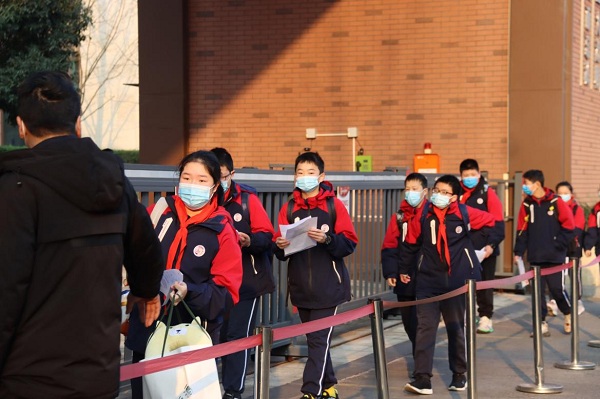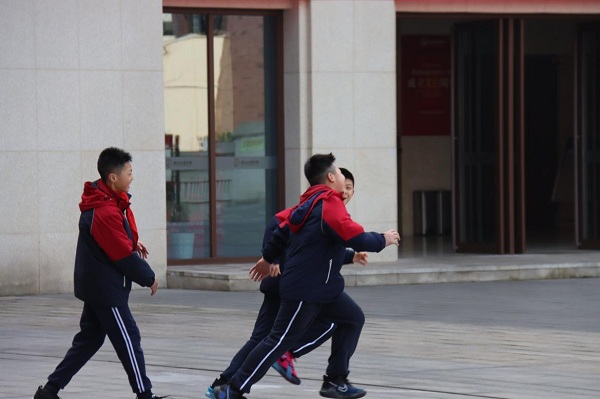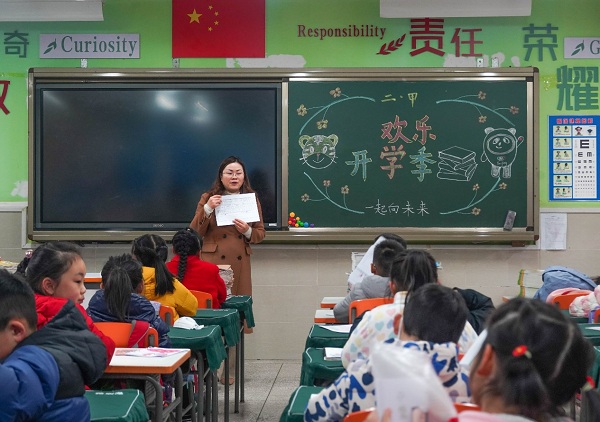Kids return from first winter break under double reduction policy
Guo Shuyu
Updated:2022-02-17
english.liangjiang.gov.cn
 |
|
Students in Liangjiang return to campus on the first day of a new semester. [Photo provided to Liangjiang New Area] |
The recent winter break of 2022 marked the first vacation from school in China since the "double reduction" policy was introduced. As the new semester kicked off on February 16, students returned to schools and shared their holiday experiences. According to students interviewed, this winter break was totally different.
The policy was issued last July to alleviate the burden of study on students and and make their development more well-rounded. It set a limit on the amount of homework that can be assigned by schools and banned subject-based after-school private tutoring for primary and middle school students.
"The policy agreed with our long-standing educational philosophy and increased our confidence," Yang Lihong, a Chinese teacher at Chongqing Liangjiang New Area Remin Primary School, told the press.
"The school has never seen the results of exams as the only thing that matters. Instead, education is about building habits and abilities for lifelong learning, enabling students to find and appreciate happiness and eventually live a better life".
According to Yang, despite the school's improved curriculum, the "double reduction" policy presented new challenges to teachers. "Classes need to be more effective and engaging, and homework is more about creating a scenario for students to explore and learn."
The 4th-grade students at the school were required to read a children's encyclopedia. "The homework was to find out the latest developments on their favorite fact in the book. The assignment excited students," said Shen Li, a Chinese teacher at the school.
According to Shen, the "double reduction" policy not only presented challenges to teachers but also asked for better time management from students.
 |
|
Students in Liangjiang return to campus on the first day of a new semester. [Photo provided to Liangjiang New Area] |
Gao Ziyao, a 6th-grade student who has been offered a place at three out of the top seven middle schools in Chongqing, told the press that the most obvious change brought by the policy is increased after-school free time.
Gao said he used to arrive home after 10 pm after off-campus tutoring and had to stay up late for homework occasionally. Since the implementation of the new policy, tutoring has been canceled and he has much more time to himself.
It also brought about a change in habits. Gao said he cut out screen time and read more before sleeping at 9:30 pm, and got up one hour earlier than before to work out every day.
"For the winter break, I talked with my parents and made a schedule. I spent the break preparing for junior high school by solving competition questions. I wanted to lose weight, so I worked out too, and now I'm 5 kilograms lighter," Gao said.
Tang Xinyan, who won a national bronze medal at a talent contest in 4th grade, was happy with the changes triggered by the policy. She signed up for seven off-campus training programs and now has time to participate in the things that interest her.
"Now I'm learning piano, singing, calligraphy, and hosting, as well as swimming in summer. I have more time to sleep and more time to play with my friends," she said in a cheerful voice. She also told the press that she was going to a children's play area in a shopping mall nearby with her schoolmates right after school.
Wang Cheng, a father of a first-grade student, just had his first winter break as a parent. He praised the school's homework as creative and thought-provoking, and said his daughter had an enjoyable winter break.
As for the entrance examination for middle school, which has not been fundamentally changed by "double reduction", Wang said it is a bit early to think about it, but he will make plans for his daughter, and that for the next two or three years, the most important thing will be cultivating his daughter's learning habits.
 |
|
In Liangjiang New Area Remin Primary School, students attend their first class of the new semester. [Photo/iChongqing] |
Video

John Edwards, the UK trade commissioner for China, praised Chongqing over its rise as a burgeoning center in intelligent manufacturing.





